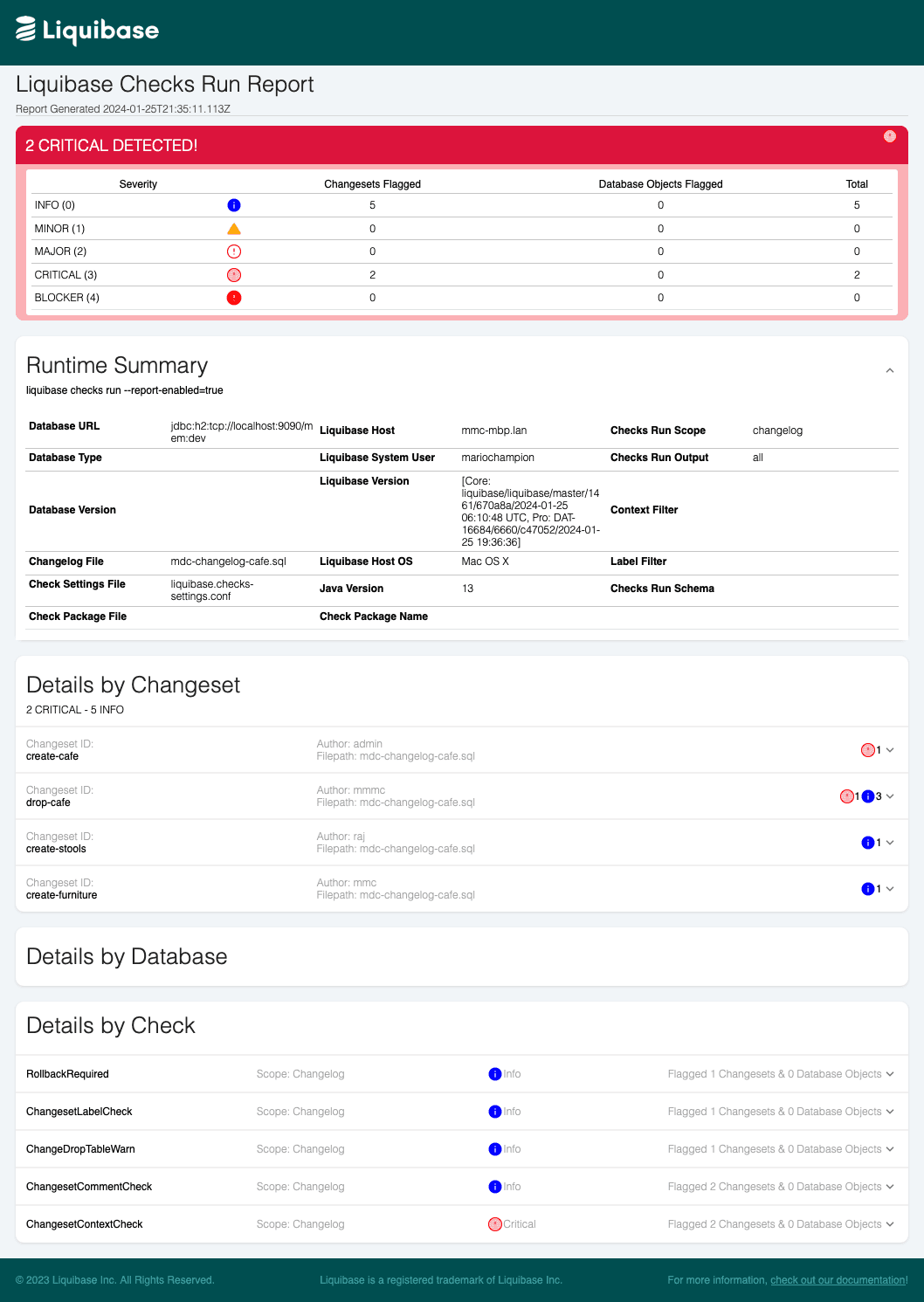What is the checks report?
Last updated: September 2, 2025
The checks report is a Liquibase operation report that provides data about the execution of Liquibase Policy Checks. You can configure checks for your changelogs and database to ensure standardized and consistent behavior with Liquibase.
In Liquibase 4.26.0 and later, you can automatically generate a checks report using the Liquibase checks run command. The checks report gives you an easy-to-read, shareable summary of command metadata, warning messages, check severity levels, check packages, and configuration details, plus an organized summary of check output in a browser page. The summary identifies changelog-scoped checks and changesets that tripped checks, their content, and any attributes. For database-scope checked, the summary contains entries for specific objects that tripped checks and a count of object types checked. You can view summaries sorted by changeset, database, and individual check.

Uses
Using Liquibase checks reports can help developers, DBAs, DevOps engineers, and managers in the following ways:
Easily scan and understand which checks have run and their results with the summary section.
Analyze your checks by viewing results by changeset, check, and database.
Collaborate with your team with shareable reports.
Checks reports in automation
To automatically use Liquibase checks reports in your CI/CD pipeline, follow these steps in your CI/CD tool:
Create a LiquibaseChecksReport job that generates the checks report. This job must:
Enable the checks report with
--reports-enabled(global scope) or--report-enabled(command scope).Run the Liquibase
checks runcommand against your changelogs and/or database.
Examples
Setting parameters
You can modify the checksreport output with the parameters listed in the tables on this page. In the CLI, global parameters go to the left of the command, and command parameters go to the right of the command.
liquibase \
--reports-enabled=true \
--reports-path=reports \
--reports-name=checks_run_report.html \
checks run \
--changelog-file="example-changelog.xml"
Note: For readability, this page shows parameters on new lines. If you type in the commands on a single line, do not include the backslashes \ shown in the examples.
You can also set parameters in your liquibase.properties file, as environment variables, or in a flow file. For a list of parameters and their syntax in each format, see What parameters can I use with operation reports?
Disable reports by default; enable only the Checks report
If you want to keep reports disabled by default and enable only the Checks report, you can use the command parameter --report-enabled (singular) on the checks run command. For example:
CLI example
liquibase checks run \
--report-enabled=true \
--report-name=my_checks_run_report.html
Flow file example
This is an example flow file running a checksreport:
stages:
Checks_Report:
actions:
- type: liquibase
command: checks run
cmdArgs: { changelog-file: "example-changelog.xml",
report-format: "HTML"}
globalArgs: { mirror-console-messages-to-log: "true",
reports-enabled: "true",
reports-path: "reports",
reports-name: "checks-report.html"}
Note: This example uses reports-enabled (plural) within globalArgs to enables all operation reports. To enable this specific kind of report, but not other reports, you must instead set report-enabled (singular) in cmdArgs.
Parameters
Our What parameters can I use with the operations report? article contains all parameters that you can use for the operations report.